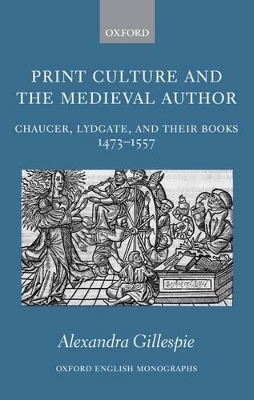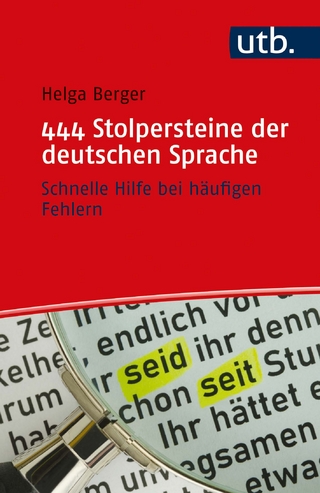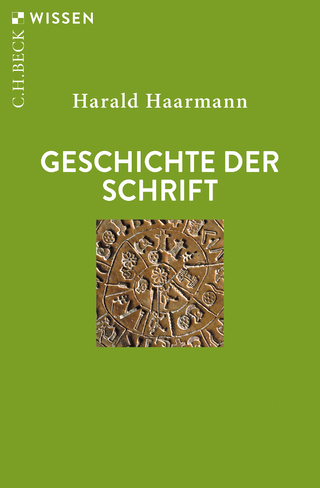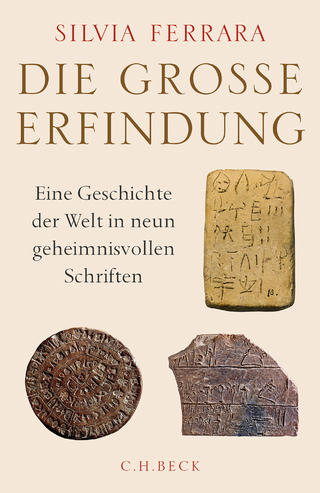
Print Culture and the Medieval Author
Chaucer, Lydgate, and Their Books 1473-1557
Seiten
2006
Oxford University Press (Verlag)
978-0-19-926295-3 (ISBN)
Oxford University Press (Verlag)
978-0-19-926295-3 (ISBN)
Alexandra Gillespie takes a new look at hundreds of neglected old books containing works by Chaucer, the 'father' of English poetry, and his much-maligned follower, John Lydgate. She demonstrates that the shift from manuscript to print was part of the controversial process by which Chaucer earned his exclusive place in English literary history.
Print Culture and the Medieval Author is a book about books. Examining hundreds of early printed books and their late medieval analogues, Alexandra Gillespie writes a bibliographical history of the poet Geoffrey Chaucer and his follower John Lydgate in the century after the arrival of printing in England. Her study is an important new contribution to the emerging 'sociology of the text' in English literary and historical studies.
At the centre of this study is a familiar question: what is an author? The idea of the vernacular writer was already contested and unstable in medieval England; Gillespie demonstrates that in the late Middle Ages it was also a way for book producers and readers to mediate the risks - commercial, political, religious, and imaginative - involved in the publication of literary texts.
Gillespie's discussion focuses on the changes associated with the shift to print, scribal precedents for these changes, and contemporary understanding of them. The treatment of texts associated with Chaucer and Lydgate is an index to the sometimes flexible, sometimes resistant responses of book printers, copyists, decorators, distributors, patrons, censors, owners, and readers to a gradual but profoundly influential bibliographical transition.
The research is conducted across somewhat intractable boundaries. Gillespie writes about medieval and modern history; about manuscript and print; about canonical and marginal authors; about literary works and books as objects. In the process, she finds new meanings for some medieval vernacular texts and a new place for some old books in a history of English culture.
Print Culture and the Medieval Author is a book about books. Examining hundreds of early printed books and their late medieval analogues, Alexandra Gillespie writes a bibliographical history of the poet Geoffrey Chaucer and his follower John Lydgate in the century after the arrival of printing in England. Her study is an important new contribution to the emerging 'sociology of the text' in English literary and historical studies.
At the centre of this study is a familiar question: what is an author? The idea of the vernacular writer was already contested and unstable in medieval England; Gillespie demonstrates that in the late Middle Ages it was also a way for book producers and readers to mediate the risks - commercial, political, religious, and imaginative - involved in the publication of literary texts.
Gillespie's discussion focuses on the changes associated with the shift to print, scribal precedents for these changes, and contemporary understanding of them. The treatment of texts associated with Chaucer and Lydgate is an index to the sometimes flexible, sometimes resistant responses of book printers, copyists, decorators, distributors, patrons, censors, owners, and readers to a gradual but profoundly influential bibliographical transition.
The research is conducted across somewhat intractable boundaries. Gillespie writes about medieval and modern history; about manuscript and print; about canonical and marginal authors; about literary works and books as objects. In the process, she finds new meanings for some medieval vernacular texts and a new place for some old books in a history of English culture.
Alexandra Gillespie is Assistant Professor in the Department of English, University of Toronto.
Introduction: The Author and the Book ; 1. Caxton and the Fifteenth-Century English Book ; 2. Good Utterance: Printing and Innovation after 1478 ; 3. Assembling Chaucer's Texts in Print, 1517 to 1532 ; 4. Court and Cloister: Editions of Lydgate, 1509 to 1534 ; 5. The Press, the Medieval Author, and the English Reformation, 1534 to 1557 ; Afterword: At Lydgate's Tomb ; Manuscripts ; Editions Printed Containing Texts Ascribed to Chaucer or Lydgate, 1473-1557
| Erscheint lt. Verlag | 30.11.2006 |
|---|---|
| Reihe/Serie | Oxford English Monographs |
| Zusatzinfo | 38 halftones in-text |
| Verlagsort | Oxford |
| Sprache | englisch |
| Maße | 145 x 223 mm |
| Gewicht | 524 g |
| Themenwelt | Geschichte ► Hilfswissenschaften ► Paläografie |
| Geisteswissenschaften ► Sprach- / Literaturwissenschaft ► Anglistik / Amerikanistik | |
| Geisteswissenschaften ► Sprach- / Literaturwissenschaft ► Literaturwissenschaft | |
| Geisteswissenschaften ► Sprach- / Literaturwissenschaft ► Sprachwissenschaft | |
| ISBN-10 | 0-19-926295-0 / 0199262950 |
| ISBN-13 | 978-0-19-926295-3 / 9780199262953 |
| Zustand | Neuware |
| Haben Sie eine Frage zum Produkt? |
Mehr entdecken
aus dem Bereich
aus dem Bereich
Schnelle Hilfe bei häufigen Fehlern
Buch | Softcover (2021)
UTB (Verlag)
18,00 €
Eine Geschichte der Welt in neun geheimnisvollen Schriften
Buch | Hardcover (2021)
C.H.Beck (Verlag)
25,00 €


